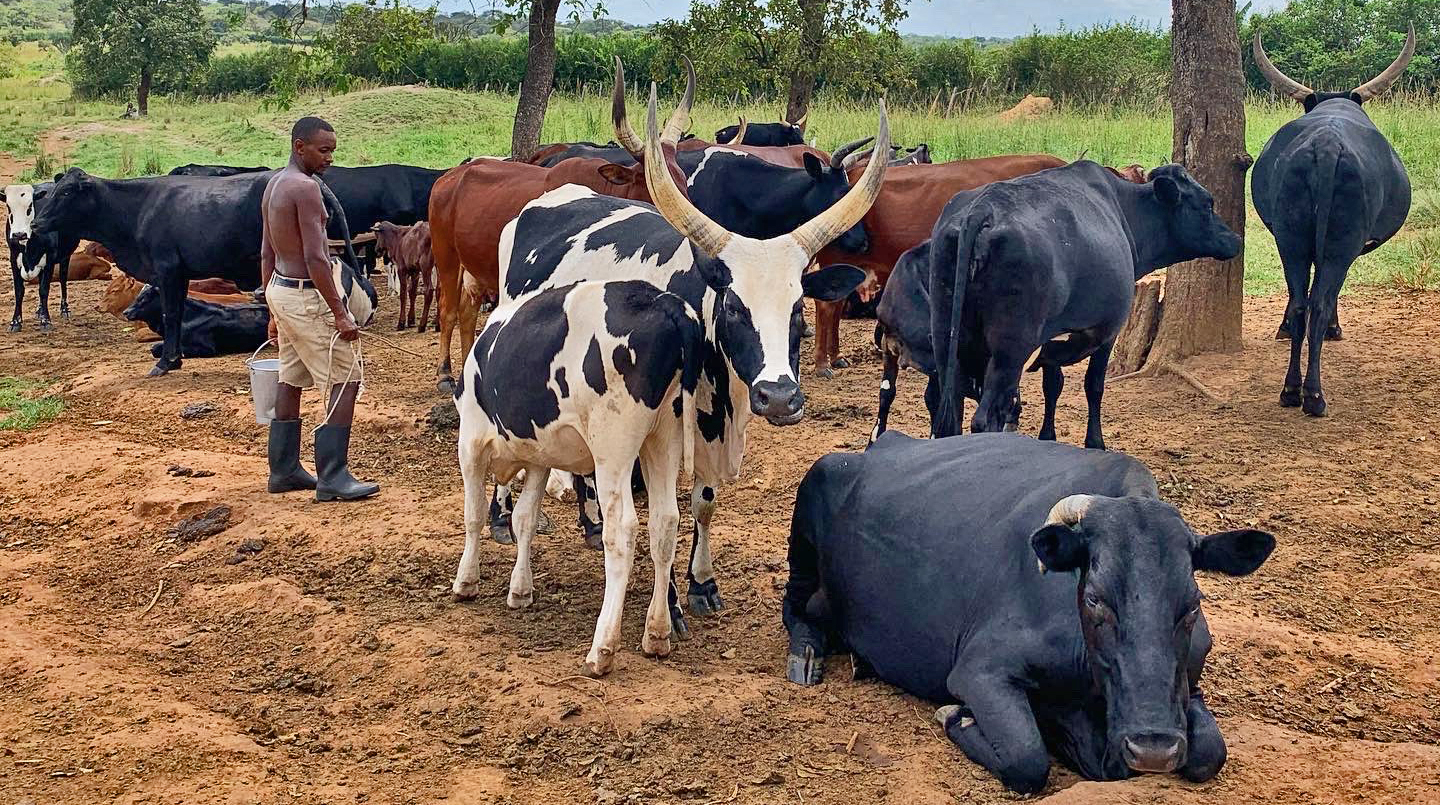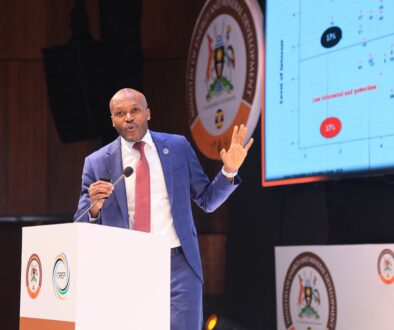Shs72.3 trillion budget to monetization economy

“While it took the country more than a century to reach US
CAPTION: A herdsman with his cattle in western Uganda, (File photo).
By Our reporter
KOLOLO – The Ministry of Finance Planning and Economic Development has unveiled a Shs72.136 trillion national budget for the 2025/2026 financial year, setting its sights on transforming every corner of the country into a hub of commercial activity.
Presented by Finance Minister Matia Kasaija at the Kololo Ceremonial Grounds on Thursday, 12 June, 2025, the budget signals a strong shift towards full monetisation of Uganda’s economy, underpinned by commercial agriculture, industrialisation, digital transformation, and expanded access to markets.
Speaking against the backdrop of a rapidly growing economy, Kasaija painted a picture of a Uganda ready to transition from resilience to acceleration.
“The budget for next financial year, and over the medium term, is focused on people and wealth creation,” he said.
Consequently, the theme of the financial year 2025/26 is: “Full Monetisation of Uganda’s Economy through Commercial Agriculture, Industrialisation, Expanding and Broadening Services, Digital Transformation and Market Access.’”
The Shs72.3 trillion resource envelope represents one of the largest in Uganda’s history, with domestic revenue expected to contribute Shs37.2 trillion, roughly 60 percent of the total. The rest will be financed through borrowing and grants. The budget deficit is estimated at 7.6 percent of GDP.
But Kasaija reassured Ugandans, stating that the government had a clear strategy to enhance domestic revenue mobilisation, widen the tax base, and strengthen tax administration.
“Government plans to collect Shs37.2 trillion in domestic revenue next financial year,” he said, adding that focus would be placed on tackling smuggling, corruption at Uganda Revenue Authority (URA), and leveraging digital tools like the Electronic Fiscal Receipting and Invoicing System to plug leakages.
Priority sectors such as health, education, agriculture, infrastructure, and tourism received large shares of the allocation.
Healthcare emerged as a major beneficiary, with Shs5.87 trillion earmarked for next year. Kasaija detailed plans to functionalise Health Centre IVs, scale up e-health systems, and expand emergency medical services. He said the government had already delivered 20 digital X-ray machines and installed CT scanners in 14 out of 16 regional referral hospitals.
“We are strengthening the National Ambulance and Emergency Care System,” he added.
In education, the Minister allocated Shs5.04 trillion to support Universal Primary and Secondary Education, student loans, the construction of new seed schools, and improvements in teacher recruitment and digital inspections.
Kasaija also confirmed the upcoming operationalisation of Bunyoro and Busoga universities, as well as continued investment in sports infrastructure ahead of African Champions Cup (CHAN) and African Cup of Nation (AFCON 2027).
“In order to improve compliance with quality standards, Government digitised school inspections in all public schools and TVET institutions,” he said.
Wealth creation programmes, a lifeline for millions of Ugandans received renewed commitment, with Shs2.43 trillion directed towards the Parish Development Model (PDM), Emyooga, the Uganda Development Bank (UDB), and other grassroots economic empowerment initiatives.
Kasaija said the PDM alone would receive Shs .059 trillion in FY2025/2026, ensuring every parish continues to receive Shs100 million annually.
“These investments are changing the lives of Ugandans by boosting household incomes, enhancing food security and creating employment opportunities,” he noted.
He revealed that over 2.6 million Ugandans have already benefited from PDM funds, with investments spanning food crops, livestock, poultry, and microenterprises. To enhance efficiency and eliminate corruption, PDM operations have been fully digitised, using systems such as the WENDI and ZAIDI apps.
On the industrial and agricultural front, the government committed Shs1.86 trillion to agro-industrialisation. This includes funding for agricultural research, irrigation schemes, fertilisers, extension services, and value addition. Kasaija highlighted the completion of 145 solar-powered irrigation schemes and the ongoing construction of 157 more.
He singled out the Agricultural Credit Facility, now worth over Shs1 trillion in disbursements, as a key driver of agricultural transformation.
“I have provided additional capital of Shs50 billion to the Agricultural Credit Facility next financial year, in addition to insurance that benefits all farmers including PDM beneficiaries.”
Uganda’s industrial and energy ambitions were also prominently featured, with Kasaija announcing an allocation of Shs875.8 billion for mineral-based industrial development and oil and gas. The East African Crude Oil Pipeline is now 58 percent complete, and an agreement has been signed for the construction of a 60,000-barrel-per-day oil refinery. Once oil production starts in 2026, government expects annual revenues of US$1 to 2.5 billion.
“Uganda currently saves up to US$72.8 million annually on fuel imports,” Kasaija said, citing the impact of the Uganda National Oil Company’s direct importation of petroleum products, which eliminated middlemen and reduced speculative pricing.
Tourism, another pillar of the economy, was allocated Shs430 billion, with an additional Shs2.2 trillion indirectly supporting tourism infrastructure such as roads, ICT, and security.
The government aims to position Uganda as a competitive MICE (Meetings, Incentives, Conferences, and Exhibitions) destination in Africa, following recent successes. “Uganda now ranks 7th in Africa in MICE tourism,” Kasaija stated.
Even as he celebrated Uganda’s achievements, such as coffee exports surging past US$1.83 billion and tourism earnings reaching US$1.52 billion, Kasaija called on Ugandans to embrace value addition and export diversification.
“While it took the country more than a century to reach US$1 billion in annual coffee export earnings, it has taken just one year to double these earnings,” he said. “I therefore implore Ugandans to grow more coffee and, most importantly, add value to our coffee before we export it.”
Kasaija expressed confidence in the direction the country is taking. With projected economic growth of 7 percent in FY2025/2026 and a GDP per capita increase to US$1,324, Uganda is moving steadily towards middle-income status.
“The necessary foundation has already been established, the speed of economic transformation is destined to be faster in the medium term.” Kasaija concluded.
to 2.5 billion.
“Uganda currently saves up to US.8 million annually on fuel imports,” Kasaija said, citing the impact of the Uganda National Oil Company’s direct importation of petroleum products, which eliminated middlemen and reduced speculative pricing.
Tourism, another pillar of the economy, was allocated Shs430 billion, with an additional Shs2.2 trillion indirectly supporting tourism infrastructure such as roads, ICT, and security.
The government aims to position Uganda as a competitive MICE (Meetings, Incentives, Conferences, and Exhibitions) destination in Africa, following recent successes. “Uganda now ranks 7th in Africa in MICE tourism,” Kasaija stated.
Even as he celebrated Uganda’s achievements, such as coffee exports surging past US
CAPTION: A herdsman with his cattle in western Uganda, (File photo).
By Our reporter
KOLOLO – The Ministry of Finance Planning and Economic Development has unveiled a Shs72.136 trillion national budget for the 2025/2026 financial year, setting its sights on transforming every corner of the country into a hub of commercial activity.
Presented by Finance Minister Matia Kasaija at the Kololo Ceremonial Grounds on Thursday, 12 June, 2025, the budget signals a strong shift towards full monetisation of Uganda’s economy, underpinned by commercial agriculture, industrialisation, digital transformation, and expanded access to markets.
Speaking against the backdrop of a rapidly growing economy, Kasaija painted a picture of a Uganda ready to transition from resilience to acceleration.
“The budget for next financial year, and over the medium term, is focused on people and wealth creation,” he said.
Consequently, the theme of the financial year 2025/26 is: “Full Monetisation of Uganda’s Economy through Commercial Agriculture, Industrialisation, Expanding and Broadening Services, Digital Transformation and Market Access.’”
The Shs72.3 trillion resource envelope represents one of the largest in Uganda’s history, with domestic revenue expected to contribute Shs37.2 trillion, roughly 60 percent of the total. The rest will be financed through borrowing and grants. The budget deficit is estimated at 7.6 percent of GDP.
But Kasaija reassured Ugandans, stating that the government had a clear strategy to enhance domestic revenue mobilisation, widen the tax base, and strengthen tax administration.
“Government plans to collect Shs37.2 trillion in domestic revenue next financial year,” he said, adding that focus would be placed on tackling smuggling, corruption at Uganda Revenue Authority (URA), and leveraging digital tools like the Electronic Fiscal Receipting and Invoicing System to plug leakages.
Priority sectors such as health, education, agriculture, infrastructure, and tourism received large shares of the allocation.
Healthcare emerged as a major beneficiary, with Shs5.87 trillion earmarked for next year. Kasaija detailed plans to functionalise Health Centre IVs, scale up e-health systems, and expand emergency medical services. He said the government had already delivered 20 digital X-ray machines and installed CT scanners in 14 out of 16 regional referral hospitals.
“We are strengthening the National Ambulance and Emergency Care System,” he added.
In education, the Minister allocated Shs5.04 trillion to support Universal Primary and Secondary Education, student loans, the construction of new seed schools, and improvements in teacher recruitment and digital inspections.
Kasaija also confirmed the upcoming operationalisation of Bunyoro and Busoga universities, as well as continued investment in sports infrastructure ahead of African Champions Cup (CHAN) and African Cup of Nation (AFCON 2027).
“In order to improve compliance with quality standards, Government digitised school inspections in all public schools and TVET institutions,” he said.
Wealth creation programmes, a lifeline for millions of Ugandans received renewed commitment, with Shs2.43 trillion directed towards the Parish Development Model (PDM), Emyooga, the Uganda Development Bank (UDB), and other grassroots economic empowerment initiatives.
Kasaija said the PDM alone would receive Shs .059 trillion in FY2025/2026, ensuring every parish continues to receive Shs100 million annually.
“These investments are changing the lives of Ugandans by boosting household incomes, enhancing food security and creating employment opportunities,” he noted.
He revealed that over 2.6 million Ugandans have already benefited from PDM funds, with investments spanning food crops, livestock, poultry, and microenterprises. To enhance efficiency and eliminate corruption, PDM operations have been fully digitised, using systems such as the WENDI and ZAIDI apps.
On the industrial and agricultural front, the government committed Shs1.86 trillion to agro-industrialisation. This includes funding for agricultural research, irrigation schemes, fertilisers, extension services, and value addition. Kasaija highlighted the completion of 145 solar-powered irrigation schemes and the ongoing construction of 157 more.
He singled out the Agricultural Credit Facility, now worth over Shs1 trillion in disbursements, as a key driver of agricultural transformation.
“I have provided additional capital of Shs50 billion to the Agricultural Credit Facility next financial year, in addition to insurance that benefits all farmers including PDM beneficiaries.”
Uganda’s industrial and energy ambitions were also prominently featured, with Kasaija announcing an allocation of Shs875.8 billion for mineral-based industrial development and oil and gas. The East African Crude Oil Pipeline is now 58 percent complete, and an agreement has been signed for the construction of a 60,000-barrel-per-day oil refinery. Once oil production starts in 2026, government expects annual revenues of US$1 to 2.5 billion.
“Uganda currently saves up to US$72.8 million annually on fuel imports,” Kasaija said, citing the impact of the Uganda National Oil Company’s direct importation of petroleum products, which eliminated middlemen and reduced speculative pricing.
Tourism, another pillar of the economy, was allocated Shs430 billion, with an additional Shs2.2 trillion indirectly supporting tourism infrastructure such as roads, ICT, and security.
The government aims to position Uganda as a competitive MICE (Meetings, Incentives, Conferences, and Exhibitions) destination in Africa, following recent successes. “Uganda now ranks 7th in Africa in MICE tourism,” Kasaija stated.
Even as he celebrated Uganda’s achievements, such as coffee exports surging past US$1.83 billion and tourism earnings reaching US$1.52 billion, Kasaija called on Ugandans to embrace value addition and export diversification.
“While it took the country more than a century to reach US$1 billion in annual coffee export earnings, it has taken just one year to double these earnings,” he said. “I therefore implore Ugandans to grow more coffee and, most importantly, add value to our coffee before we export it.”
Kasaija expressed confidence in the direction the country is taking. With projected economic growth of 7 percent in FY2025/2026 and a GDP per capita increase to US$1,324, Uganda is moving steadily towards middle-income status.
“The necessary foundation has already been established, the speed of economic transformation is destined to be faster in the medium term.” Kasaija concluded.
.52 billion, Kasaija called on Ugandans to embrace value addition and export diversification.
“While it took the country more than a century to reach US
.83 billion and tourism earnings reaching US
.52 billion, Kasaija called on Ugandans to embrace value addition and export diversification.“While it took the country more than a century to reach US billion in annual coffee export earnings, it has taken just one year to double these earnings,” he said. “I therefore implore Ugandans to grow more coffee and, most importantly, add value to our coffee before we export it.”
Kasaija expressed confidence in the direction the country is taking. With projected economic growth of 7 percent in FY2025/2026 and a GDP per capita increase to US,324, Uganda is moving steadily towards middle-income status.
“The necessary foundation has already been established, the speed of economic transformation is destined to be faster in the medium term.” Kasaija concluded.
to 2.5 billion.
“Uganda currently saves up to US.8 million annually on fuel imports,” Kasaija said, citing the impact of the Uganda National Oil Company’s direct importation of petroleum products, which eliminated middlemen and reduced speculative pricing.
Tourism, another pillar of the economy, was allocated Shs430 billion, with an additional Shs2.2 trillion indirectly supporting tourism infrastructure such as roads, ICT, and security.
The government aims to position Uganda as a competitive MICE (Meetings, Incentives, Conferences, and Exhibitions) destination in Africa, following recent successes. “Uganda now ranks 7th in Africa in MICE tourism,” Kasaija stated.
Even as he celebrated Uganda’s achievements, such as coffee exports surging past US
.83 billion and tourism earnings reaching US.52 billion, Kasaija called on Ugandans to embrace value addition and export diversification.“While it took the country more than a century to reach US billion in annual coffee export earnings, it has taken just one year to double these earnings,” he said. “I therefore implore Ugandans to grow more coffee and, most importantly, add value to our coffee before we export it.”
Kasaija expressed confidence in the direction the country is taking. With projected economic growth of 7 percent in FY2025/2026 and a GDP per capita increase to US,324, Uganda is moving steadily towards middle-income status.
“The necessary foundation has already been established, the speed of economic transformation is destined to be faster in the medium term.” Kasaija concluded.


